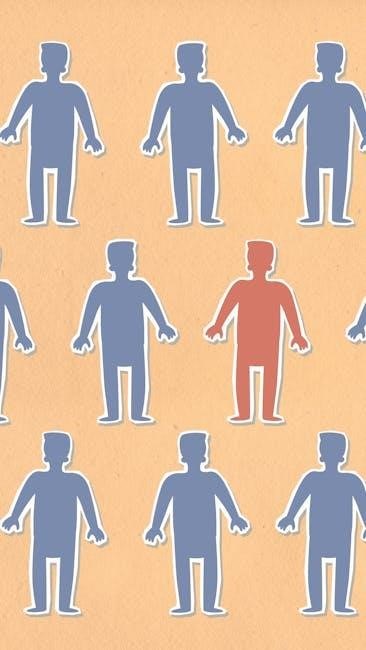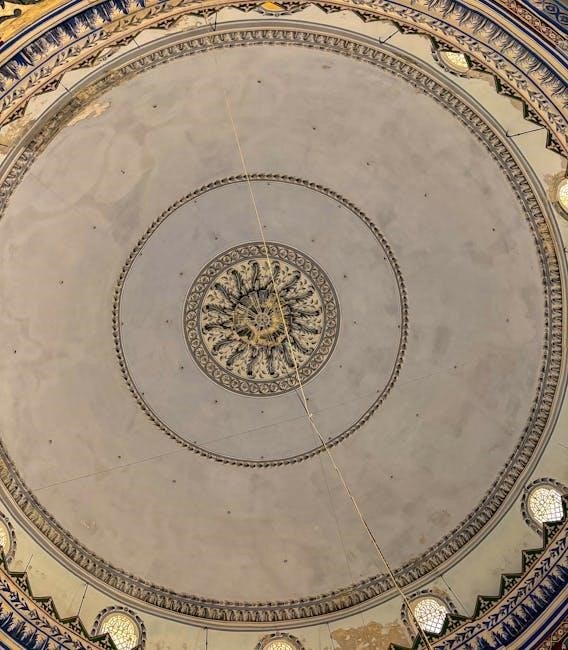Gilles Deleuze’s Difference and Repetition is a groundbreaking philosophical work that challenges traditional notions of identity and representation, emphasizing difference as a foundational principle of existence. Published in 1968, it is considered Deleuze’s magnum opus and a contemporary classic, offering a bold critique of Western philosophy through innovative concepts. The book has been widely influential, shaping modern thought in philosophy, art, and science, and remains a key text for understanding Deleuze’s unique philosophical vision. Its exploration of repetition as a means to understand difference has made it a seminal work in contemporary philosophy.
Overview of Gilles Deleuze’s Magnum Opus
Difference and Repetition is Gilles Deleuze’s most influential work, a philosophical masterpiece that challenges traditional metaphysics and epistemology. Published in 1968, it presents a radical critique of identity, representation, and generality, arguing for difference as the fundamental principle of existence. Deleuze draws on Nietzsche, Bergson, and Kant to develop a new ontology of difference, where repetition is not mere copying but a creative force. This work is celebrated for its originality and interdisciplinary relevance, making it a cornerstone of contemporary philosophy and a testament to Deleuze’s innovative thinking.
Historical Context and Philosophical Significance
Published in 1968, Difference and Repetition emerged during a period of intellectual and political upheaval in France, reflecting Deleuze’s engagement with the crises of modern thought. The work challenges traditional Western philosophy, particularly Kantian and Hegelian frameworks, by positing difference as the primary ontological category. Drawing on Nietzsche’s eternal return and Bergson’s concepts of duration, Deleuze critiques identity, representation, and generality, offering a radical alternative to metaphysical and epistemological traditions. Its philosophical significance lies in its post-structuralist innovation, reshaping debates in philosophy, cultural theory, and beyond.
Key Concepts in “Difference and Repetition”
Difference and Repetition introduces groundbreaking concepts, positing difference as a primary ontological principle rather than a derivative of identity. Repetition, distinct from generality, is framed as a creative process that uncovers the uniqueness of entities. These ideas challenge traditional metaphysics, emphasizing the dynamic interplay of difference and repetition as forces driving existence and thought. The book’s central arguments redefine philosophical inquiry, offering a radical alternative to conventional understandings of being, identity, and change.
Difference as a Foundational Principle
Difference, for Deleuze, is not a derivative of identity but an ontological principle in itself. He argues that traditional philosophy has subordinated difference to identity, representation, and negation, obscuring its primacy. In Difference and Repetition, Deleuze posits difference as the fundamental force driving existence, creativity, and thought. This principle challenges conventional metaphysics, which often relies on unity and sameness. By asserting difference as foundational, Deleuze opens new avenues for understanding reality, emphasizing the dynamic and relational nature of being. This idea is central to his critique of representation and identity, reshaping philosophical inquiry.
The Role of Repetition in Philosophical Thought
Repetition, in Deleuze’s philosophy, is not mere duplication but a dynamic process that reveals difference. It disrupts the notion of identity, showing how things are always in flux. Deleuze distinguishes repetition from generality, arguing that it is a unique, creative force. Repetition allows difference to emerge, challenging traditional concepts of being and knowledge. By embracing repetition, Deleuze reimagines philosophy as a practice of innovation rather than representation, aligning it with Nietzsche’s eternal return and Bergson’s duration. This concept is central to his critique of identity and his vision of a philosophy rooted in change and creativity.

Critique of Identity and Representation
Deleuze challenges traditional notions of identity and representation, arguing that identity is fluid, shaped by difference and repetition. He critiques Western philosophy’s reliance on representation, emphasizing difference over static identity constructs.
Challenging Traditional Notions of Identity
Deleuze challenges traditional notions of identity by arguing that identity is not fixed or essential but is shaped by difference and repetition. He contends that identity emerges from the interaction of differences rather than being a stable, self-contained entity. This perspective opposes conventional philosophical views that prioritize identity over difference, offering a radical shift in understanding being and existence. By emphasizing difference as fundamental, Deleuze critiques metaphysical assumptions about identity, advocating for a dynamic understanding of reality rooted in multiplicity and change.
Repetition as a Means to Understand Difference
Deleuze posits repetition as a critical mechanism for understanding difference, arguing that repetition is not mere duplication but a process that reveals new possibilities. By repeating, entities transform and create novel connections, thereby uncovering the underlying differences that define them. This perspective challenges the notion that repetition leads to sameness, instead highlighting its role in generating diversity and complexity. Through repetition, Deleuze illustrates how difference emerges as a dynamic and creative force, reshaping our understanding of identity and existence.

The Influence of Other Philosophers
Deleuze’s work in Difference and Repetition draws heavily from Nietzsche’s concept of eternal return and Bergson’s theories of duration and change, reshaping these ideas into his unique philosophical framework.
Nietzsche and the Concept of Eternal Return
Friedrich Nietzsche’s concept of eternal return profoundly influenced Gilles Deleuze’s Difference and Repetition. Nietzsche’s idea posits that all events recur infinitely, emphasizing affirmation of life’s repetitions. Deleuze reinterprets this concept, linking it to his philosophy of difference, where repetition is not of the same but of difference itself. This reinterpretation allows Deleuze to critique traditional notions of identity and being, aligning the eternal return with his vision of a dynamic, ever-differing universe. Through this engagement, Deleuze develops a unique metaphysics that celebrates creativity and change over static identity.
Bergson’s Impact on Deleuze’s Ideas
Henri Bergson’s philosophy significantly influenced Gilles Deleuze, particularly in his concepts of duration and intuition. Bergson’s emphasis on the fluid, dynamic nature of time and reality resonated with Deleuze’s critique of static identity. In Difference and Repetition, Deleuze draws on Bergson’s ideas to challenge traditional notions of being and representation, incorporating the concept of duration to emphasize the creative and differencing forces of time. This alignment allows Deleuze to develop a metaphysics rooted in change and becoming, central to his philosophical project.

Modern Relevance and Applications
Difference and Repetition continues to inspire contemporary thought across various disciplines, offering novel perspectives on identity, time, and creativity. Its ideas resonate in science, art, and political theory, providing frameworks for understanding complexity and change in modern contexts.
Difference and Repetition in Contemporary Philosophy
Difference and Repetition remains a cornerstone of contemporary philosophy, influencing post-structuralist and postmodern thought. Deleuze’s concepts of difference and repetition challenge traditional metaphysics, offering new ways to explore identity, time, and being. His critique of representation and emphasis on difference as a foundational principle have shaped debates in ontology, epistemology, and aesthetics. The text’s interdisciplinary relevance continues to inspire scholars across philosophy, cultural studies, and political theory, making it a vital resource for understanding modern philosophical issues.
Interdisciplinary Applications in Science and Art
Deleuze’s concepts of difference and repetition have inspired groundbreaking applications in science and art. In science, his ideas on complexity and dynamic systems offer new perspectives on understanding change and evolution. In art, his theories on repetition as a creative force shape contemporary practices, encouraging artists to explore innovative forms of expression. This interdisciplinary relevance underscores the universal appeal of Deleuze’s philosophy, bridging gaps between disciplines and fostering fresh interpretations of reality and creativity.

Structure and Key Chapters
Difference and Repetition is structured into key chapters, with Difference in Itself and Repetition for Itself central to its exploration of foundational philosophical concepts and their interplay.
Chapter 1: Difference in Itself
In Difference and Repetition, Chapter 1 introduces the concept of “difference in itself,” challenging traditional views that equate difference with negation or opposition. Deleuze argues that difference should not be understood through representation or identity but as an independent, affirmative force. He critiques the Kantian and atomistic approaches that reduce difference to the same or the general. The chapter lays the groundwork for his philosophy by positing difference as a self-sufficient principle, detached from external frameworks, thus revolutionizing how difference is perceived in philosophy.
Chapter 2: Repetition for Itself
In Difference and Repetition, Chapter 2 explores repetition as a distinct philosophical concept, separate from generality or identity. Deleuze argues that repetition is not merely the duplication of the same but rather an affirmation of difference. He distinguishes repetition from habits or conventions, framing it as a creative force that disrupts established structures. Drawing on Nietzsche’s concept of eternal return, Deleuze posits repetition as a means to embrace difference and challenge traditional notions of being and identity, thereby redefining repetition as a transformative philosophical principle.

Reception and Legacy
Difference and Repetition is widely regarded as a contemporary classic, praised for its originality and depth. Despite initial critical challenges, it has profoundly influenced modern philosophy, cultural studies, and interdisciplinary thought, solidifying Deleuze’s legacy as a visionary thinker. Michel Foucault famously hailed it as a key text in modern European philosophy, underscoring its enduring relevance and intellectual impact across diverse fields.
Critical Responses and Academic Debate
Deleuze’s Difference and Repetition has sparked intense academic debate, with scholars praising its originality while others find its complexity challenging. Michel Foucault hailed it as a key text in modern European thought, emphasizing its groundbreaking critique of identity and representation. Critics argue that its dense philosophical language limits accessibility, yet its influence across disciplines like cultural studies and political theory remains undeniable. The work’s provocative ideas continue to fuel debates, solidifying its status as a pivotal text in contemporary philosophy and interdisciplinary studies.

Difference and Repetition as a Contemporary Classic
Difference and Repetition is widely regarded as a contemporary classic in philosophy, celebrated for its innovative critique of identity and representation. Deleuze’s exploration of difference and repetition has reshaped modern thought, influencing fields beyond philosophy, including cultural studies, art, and science. Its enduring relevance lies in its ability to challenge traditional frameworks, offering fresh perspectives on existence and reality. As a seminal work, it continues to inspire new generations of scholars and thinkers, cementing its place in the canon of contemporary philosophy.

Future Implications and Continued Relevance
Deleuze’s ideas in Difference and Repetition continue to inspire future philosophical thought and influence interdisciplinary studies, ensuring their significant relevance in contemporary and future discussions.

The Enduring Influence of Deleuze’s Ideas
Gilles Deleuze’s revolutionary concepts in Difference and Repetition continue to profoundly impact modern philosophy, cultural studies, and various artistic fields. His critique of identity and representation has reshaped how scholars approach topics like subjectivity, power, and creativity. Deleuze’s emphasis on difference as a generative force has inspired new methodologies in fields such as postcolonial theory, feminist philosophy, and digital humanities. His ideas remain a vital framework for understanding contemporary complexities, ensuring his work’s lasting relevance and influence across disciplines.

